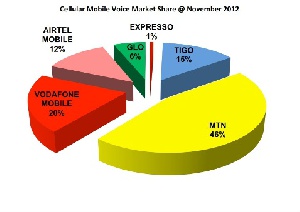The number of Mobile Phone Subscriptions in the country grew by 20 percent last year to 25.6 million, pointing to the fact that use of mobile services continues to grow strongly.
Latest figures from the industry regulator National Communications Authority (NCA) show that mobile phone network operators added a little over 4.35 million new active mobile phone lines to the 21,265,706 subscriptions at the beginning of 2012, bringing the year-end figure to 25,618,427.
This brings the mobile phone penetration rate to more than 100 percent, which statistically means that access to mobile phone services is available to all the estimated 24.6 million Ghanaian population.
In reality, however, the more than 100 percent penetration rate does not mean that every Ghanaian owns a mobile phone or a SIM card, as “multiple simming” -- which happens when one subscriber owns more than one SIM card -- is prevalent in the market.
The growth of Mobile Voice Subscriptions to some extent substitutes fixed-line access. In fact, whilst mobile voice has continued to increase astronomically, fixed-line voice growth recorded just about three percent growth last year; ending the year at 284,981.
This development, though it excites mobile phone network stakeholders, further affirms industry players’ fears that the country’s voice telephony market is fast-reaching saturation point, with opportunities now being in the data market.
This is especially so as Glo Ghana has made inroads by attracting close on two million to the network, which is expected to further deepen competition and impact negatively on the operators’ Average Revenue per User.
And with the SMS revenue of operators being hit by regulatory requirements concerning their text and win promotions, the profit margin for telecom operators will continue to decline until strategies are aligned to grow and capture the data market, which has a low level of penetration.
Concerns are however rife that the mobile network operators are pushing for subscriber growth to the detriment of service-quality.
The Director of Special Projects at the NCA, Major (Rtd) Emmanuel Owusu-Adansi, recently said the regulator is concerned with network operators’ resolve to expand their subscriber base without adhering strictly to the quality-of-service standards set by the regulator.
He said: “Despite the significant subscriber growth achieved by mobile network operators in the country, there is a serious problem with the quality of service.
“As complaints increase, we will have to exert pressure on operators to live up to expectations.”
Currently, there are six mobile operators in the country who are all competing for significant share in a market of about 24.6 million people.
According to the latest NCA figures, MTN controls 46 percent of the mobile telephony market with a subscriber base of a little over 11.7 million subscribers -- cementing the company’s place as leading mobile network operator in the country.
Vodafone’s subscriber base increased to 5.25 million, which represents 21 percent of total Market share.
Tigo had a marginal subscriber base increase, closing at 3.6 million and representing 14 percent of the market, while Airtel increased its subscriber base to 3.1 million -- 12 percent of the total Market share.
Glo’s subscriber base decreased slightly from its figures for October; its current subscriber base of 1.5 million represents six percent of the total Market share.?
Expresso also saw its subscriber base decreased to 165,863. The figure of 165,863 represents one percent of the total Market share.
Business News of Friday, 8 February 2013
Source: B&FT













